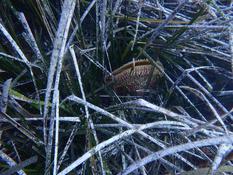- Homepage
- The Environment
- Actualités
- Death of noble pen shells in Principality
Death of noble pen shells in Principality
As part of the Department of the Environment’s efforts to monitor marine species, a spate of unusual deaths affecting noble pen shells was noted a few days ago. The deaths were caused by an epidemic whose first consequences were recorded in populations on the south-east of the Iberian Peninsula and in the Balearic Islands in late 2016.
The mass deaths subsequently spread to the entire Spanish coastline as well as numerous locations in France and Italy (marine reserves in Banyuls, Corsica, Sicily and Sardinia).
The Principality’s noble pen shell populations have, in turn, been affected by this epidemic, for which the mortality rate can reach 100% of a known population.
Experts* have confirmed that the epidemic is caused by a new species of parasite, Haplosporidium, which is found in the digestive glands of infected shells (death is attributed to the parasite directly blocking the digestive gland: the bivalve dies from starvation). Initial observations appear to indicate that the parasite’s lifecycle is at least partially influenced by temperature, so seasonal increases in temperature are likely to help it spread.
The Department of the Environment, in close consultation with a network of French and Spanish scientists, has carried out several survey dives along the entire Monegasque coastline and has taken a series of actions aimed at trying to protect the species. These include trials where the shells have been transplanted to deep waters, since the parasite seems to be less active in colder waters.
Added to this, there is a need for increased surveillance carried out in conjunction with the Monegasque Association for Nature Protection and divers in the Principality. The latter were informed of the epidemic’s spread during an awareness workshop organised by the RAMOGE Agreement last August.
The Ministry of Public Works, the Environment and Urban Development is committed to working very closely with all stakeholders in the Principality (the Prince Albert II Foundation, the Oceanographic Museum, Monaco Scientific Centre and the Monegasque Association for Nature Protection) in order to address every facet of this issue, and no piece of information, avenue for analysis or solution to remedy the problem will be ignored.
Finally, the Department of the Environment would like to remind everyone that the noble pen shell remains a protected species, even when dead, and that removal of shells is prohibited.
For more information, contact: environnement@gouv.mc
-----------------------------------------------------------------------------------------------------------------
* IUCN (2018). Report of the Working Group Meeting on the Mass Mortality Event of the Pen Shell Pinna nobilis and the Emergency Response.
Vázquez-Luis, Maite & Elvira, Alvarez Perez & Barrajón, Agustín & Garcia-March, Jose & Grau, Amalia & Hendriks, Iris & Jiménez, Santiago & Kersting, Diego & Moreno, Diego & Pérez, Marta & M Ruiz, Juan & Sánchez, Jordi & Villalba, Antonio & Deudero, Salud. (2017). S.O.S. Pinna nobilis: A Mass Mortality Event in the Western Mediterranean Sea. Frontiers in Marine Science. 4. 10.3389/fmars.2017.00220.
Catanese, G., Grau, A., Valencia, J.M., Garcia-March, J.R., Alvarez, E., Vázquez-luis, M., Deudero, S., Darriba, S., Carballal, M.J., Villalba, A. (Submitted). Haplosporidium pinnae sp. nov., a haplosporidan parasite associated with mass mortalities of the fan mussel, Pinna nobilis, in the Western Mediterranean Sea. Journal of Invertebrate Pathology.
-----------------------------------------------------------------------------------------------------------------
*IUCN (2018). Report of the Working group meeting Mass Mortality event of the pen shell Pinna nobilis and Emergency response.
Vázquez-Luis, Maite & Elvira, Alvarez Perez & Barrajón, Agustín & Garcia-March, Jose & Grau, Amalia & Hendriks, Iris & Jiménez, Santiago & Kersting, Diego & Moreno, Diego & Pérez, Marta & M Ruiz, Juan & Sánchez, Jordi & Villalba, Antonio & Deudero, Salud. (2017). S.O.S. Pinna nobilis: A Mass Mortality Event in Western Mediterranean Sea. Frontiers in Marine Science. 4. 10.3389/fmars.2017.00220.
Catanese, G., Grau, A., Valencia, J.M., Garcia-March, J.R., Alvarez, E., Vazquez-Luis, M., Deudero, S., Darriba, S., Carballal, M.J., Villalba, A. (Submitted). Haplosporidium pinnae sp. nov., a haplosporidan parasite associated with massive mortalities of the fan mussel, Pinna nobilis, in the Western Mediterranean Sea. Journal of Invertebrate Pathology.
Autres actualités du thème

UNOC – PRINCIPALITY OF MONACO SIGNS CHARTER ON SUSTAINABLE CRUISING IN THE MEDITERRANEAN 2025 PROMOTED BY FRENCH GOVERNMENT

La Direction de l’Environnement et ses partenaires célèbrent la Journée Mondiale de l’Environnement

APIdays - National Awareness Days for Bees, Environmental Sentinels – 2025 edition
- Principality of Monaco’s Climate Air Energy Plan
- The latest news of the Responsible Trading and Responsible Restaurant Certifications
- A guide to banning single-use plastic bags: A bag for life
- Guide to responsible, safe bathing in the Principality
- The Tree Code
- The Environment in the Principality of Monaco – Data Compendium
- Monaco Environment booklet








